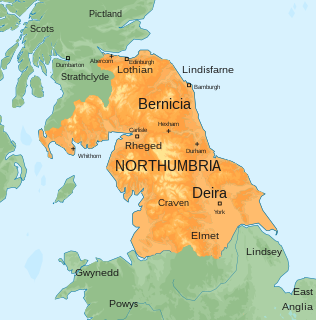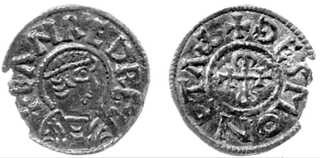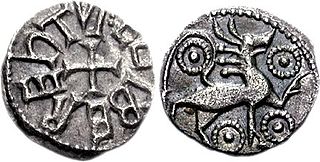Related Research Articles
Causantín or Constantín mac Cináeda was a king of the Picts. He is often known as Constantine I in reference to his place in modern lists of kings of Scots, but contemporary sources described Causantín only as a Pictish king. A son of Cináed mac Ailpín, he succeeded his uncle Domnall mac Ailpín as Pictish king following the latter's death on 13 April 862. It is likely that Causantín's reign witnessed increased activity by Vikings, based in Ireland, Northumbria and northern Britain. He died fighting one such invasion.

Northumbria was an early medieval Anglo-Saxon kingdom in what is now Northern England and south-east Scotland.

Ecgberht, also spelled Egbert, Ecgbert, Ecgbriht and Ecgbeorht or Ecbert, was King of Wessex from 802 until his death in 839. His father was Ealhmund of Kent. In the 780s Ecgberht was forced into exile to Charlemagne's court in the Frankish Empire by Offa of Mercia and Beorhtric of Wessex, but on Beorhtric's death in 802 Ecgberht returned and took the throne.

Wulfhere or Wulfar was King of Mercia from 658 until 675 AD. He was the first Christian king of all of Mercia, though it is not known when or how he converted from Anglo-Saxon paganism. His accession marked the end of Oswiu of Northumbria's overlordship of southern England, and Wulfhere extended his influence over much of that region. His campaigns against the West Saxons led to Mercian control of much of the Thames valley. He conquered the Isle of Wight and the Meon valley and gave them to King Æthelwealh of the South Saxons. He also had influence in Surrey, Essex, and Kent. He married Eormenhild, the daughter of King Eorcenberht of Kent.

Penda was a 7th-century King of Mercia, the Anglo-Saxon kingdom in what is today the Midlands. A pagan at a time when Christianity was taking hold in many of the Anglo-Saxon kingdoms, Penda took over the Severn Valley in 628 following the Battle of Cirencester before participating in the defeat of the powerful Northumbrian king Edwin at the Battle of Hatfield Chase in 633.
Eanflæd was a Deiran princess, queen of Northumbria and later, the abbess of an influential Christian monastery in Whitby, England. She was the daughter of King Edwin of Northumbria and Æthelburg, who in turn was the daughter of King Æthelberht of Kent. In or shortly after 642 Eanflæd became the second wife of King Oswiu of Northumbria. After Oswiu's death in 670, she retired to Whitby Abbey, which had been founded by Hilda of Whitby. Eanflæd became the abbess around 680 and remained there until her death. The monastery had strong association with members of the Northumbrian royal family and played an important role in the establishment of Roman Christianity in England.

Aldfrith was king of Northumbria from 685 until his death. He is described by early writers such as Bede, Alcuin and Stephen of Ripon as a man of great learning. Some of his works and some letters written to him survive. His reign was relatively peaceful, marred only by disputes with Bishop Wilfrid, a major figure in the early Northumbrian church.

Eanred was king of Northumbria in the early ninth century.
Ælla was King of Northumbria, a kingdom in medieval England, during the middle of the 9th century. Sources on Northumbrian history in this period are limited, and so Ælla's ancestry is not known and the dating of the beginning of his reign is questionable.

Ecgbert was an 8th-century cleric who established the archdiocese of York in 735. In 737, Ecgbert's brother became king of Northumbria and the two siblings worked together on ecclesiastical issues. Ecgbert was a correspondent of Bede and Boniface and the author of a legal code for his clergy. Other works have been ascribed to him, although the attribution is doubted by modern scholars.

Eadberht was king of Northumbria from 737 or 738 to 758. He was the brother of Ecgbert, Archbishop of York. His reign is seen as a return to the imperial ambitions of seventh-century Northumbria and may represent a period of economic prosperity. He faced internal opposition from rival dynasties and at least two actual or potential rivals were killed during his reign. In 758 he abdicated in favour of his son Oswulf and became a monk at York.

Æthelwald Moll was King of Northumbria, the historic petty kingdom of Angles in medieval England, from 759 to 765. He seized power after the murder of Oswulf son of Eadberht; his ancestry and connection to the royal family of Northumbria is unknown. Æthelwald faced at least one rebellion, led by Oswine, perhaps a brother of Oswulf. In 765 a Witenagemot of Northumbrian notables deposed Æthelwald and replaced him with Alhred, a kinsman of his predecessor. After his removal from the throne Æthelwald became a monk, perhaps involuntarily.
Ricberht, may have briefly ruled East Anglia, a small independent Anglo-Saxon kingdom which today forms the English counties of Norfolk and Suffolk. Little is known of his life or his reign.
Eardwulf was king of Northumbria from 796 to 806, when he was deposed and went into exile. He may have had a second reign from 808 until perhaps 811 or 830. Northumbria in the last years of the eighth century was the scene of dynastic strife between several noble families: in 790, king Æthelred I attempted to have Eardwulf assassinated. Eardwulf's survival may have been viewed as a sign of divine favour. A group of nobles conspired to assassinate Æthelred in April 796 and he was succeeded by Osbald: Osbald's reign lasted only twenty-seven days before he was deposed and Eardwulf became king on 14 May 796.

Rædwulf was king of Northumbria for a short time. His ancestry is not known, but it is possible that he was a kinsman of Osberht and Ælla.

Osberht was king of Northumbria in the middle of the 9th century. Sources on Northumbrian history in this period are limited. Osberht's descent is not known and the dating of his reign is problematic.
Ricsige was King of Northumbria from 873 to 876. He became king after Ecgberht I was overthrown and fled, with Wulfhere, Archbishop of York, to Mercia.
Ecgberht was a king in Northumbria in the later ninth century. Very little is known of his reign.
Guthred or Guthfrith was the king of Viking Northumbria from circa 883 until his death.
References
- Kirby, D.P., The Earliest English Kings. London: Unwin, 1991. ISBN 0-04-445692-1
- Higham, N.J., The Kingdom of Northumbria AD 350–1100. Stroud: Sutton, 1993. ISBN 0-86299-730-5
- Symeon of Durham (1855). "The Historical Works of Simeon of Durham". Church Historians of England, volume III, part II. J. Stevenson, translator. Seeley's. Retrieved 27 January 2007.